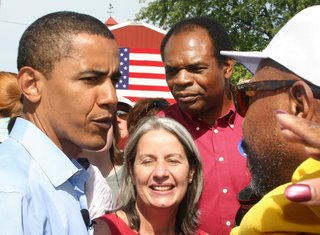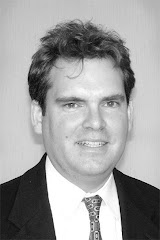
DOUGLAS BURNS
Staff Writer
INDIANOLA - With soaring rhetoric and a rare magnetism, U.S. Sen. Barack Obama Sunday burnished his growing reputation as a political descendent to the barrier-breaking, nation-inspiring John F. Kennedy.
Trailed by a horde of media and circled like a popular evangelist or rock star by well-wishers, many of them seeking autographs for copies of his best-selling memoir, "Dreams From My Father: A Story of Race and Inheritance," Obama, an Illinois Democrat, spoke individually with hundreds of Iowans before giving a 45-minute keynote speech at U.S. Sen. Tom Harkin's annual steak fry at the Warren County Fairgrounds in Indianola.
The major Democratic event attracted some 3,000 people. Several members of the national media were there to see Obama, who rocketed from relative obscurity to the political stratosphere with a stirring speech to the Democratic National Convention in 2004.
Harkin, D-Iowa, joked that he'd originally tried to book U2 singer Bono, a global celebrity, for the featured speaking role.
"I couldn't get him so I settled for the second biggest rock star in America," Harkin said in introducing Obama.
Several Iowa Democrats, including Harkin and gubernatorial candidate Chet Culver and Iowa Gov. Tom Vilsack gave rousing speeches, as did potential presidential candidate Mark Warner of Virginia, but the Sunday stage belonged to Obama, who spoke with no written text or teleprompter.
"Despite the much-vaunted individual initiative and self-reliance that has been at the essence of the American dream, the fact of the matter is there has always been this other idea of America, this idea that says we have a stake in each other, that I am my brother's keeper," Obama said.
He said Americans intuitively understand that idea in churches and families.
"But it also has to reflect itself in our government," Obama said. "Nobody here expects government to solve all our problems for us. But what they do expect is that the government can help, the government can make a difference in all of our lives."
Obama, who worked in Chicago as a community organizer, civil rights lawyer and law professor, is the son of a Kenyan father, Barack Obama Sr., and Kansan mother, Ann Dunham.
He joked that one of the first questions he fields from people is the origin of his name.
"People wouldn't always say it right," Obama said. "They would call me 'Alabama' or they would call me, 'Yo mamma.'"
He added, "My father was from Kenya. That's where I got my name. And then my mother was from Kansas, which is where I got my accent."
Elected to the U.S. Senate in 2004, Obama, 45, is frequently mentioned by Democratic Party regulars and pundits as a possible presidential candidate in 2008.
"As you travel across the country there's a certain anxiety," Obama said.
Americans are confident in their nation but frustrated with their leaders, he said.
"It's not that they don't believe in the possibilities," Obama said. "They continue to believe that the possibilities of America are limitless. They're just not sure the leaders still do."
Obama said the nation can regain a sense of hope and possibility he believes has been lost.
"In America there is no challenge too great, there is no injustice too crippling, there is no destiny out of reach for those of us who are lucky enough to be born in this country," he said.
In his speech, Obama quoted Kennedy, Abraham Lincoln, Martin Luther King and even former GOP Speaker of the House Newt Gingrich. Obama noted that Gingrich famously said the Democratic strategy in the face of Republican negatives in 2006 should be "had enough."
"I don't think that George Bush is a bad man, I don't," Obama said. "I think that George Bush wants to do right by America. I think he's a patriotic person."
But Obama said he has a fundamental disagreement over philosophy of government with Bush and his Republican supporters in Congress.
"They believe in different things," Obama said. "They have a sense that in fact the government is the problem, not the solution and that if we just dismantle government piece by piece, if we break it up in tax cuts to the wealthy, and privatize Social Security and get rid of public school … if we just break everything up, everyone's going to better off.
"That's the basic concept behind the ownership society. That's what George Bush and this Republican Congress have been arguing for the last six years, and it's a tempting idea because it doesn't require anything from each of us. It's very easy for us to say that I'm only going to think selfishly about myself, that I don't have to worry that 46 million people who don't have health insurance."
Obama said that everywhere he goes in America he gets a sense that people want a change.
"At some level even those of us who are involved in politics feel a certain cynicism right now about politics and public life," Obama said. "We get a sense that it's become a business and not a mission, that power always trumps principles. We've got a lot of self-appointed leaders that are long on rhetoric and short on substance."
He said the nation is at a crossroads, with choices that will define a generation.
"We understand that all across America people are struggling because they sense that in a new globalized world we have given power through communication and changes in technology not only to our economic competitors but also to those who would seek to destroy our way of life," Obama said.
He said Iowa children must be taught the skills to compete not just in places like Des Moines and Chicago and Boston, but with people in China and India.
"If we don't make sure that we're preparing our children, we may be the first generation in history, or at least in a very long time, in which our children have inherited an America that's a little bit meaner and a little bit poorer than the one we inherited from our parents," Obama said. "That's not what we believe as Americans."
Moving to foreign affairs and security, Obama said he's tired of the Bush administration and Republicans' use of terrorism as a wedge issue.
"I don't know about you but I think the war against terrorism isn't supposed to just crop up between September and November in even-numbered years, and yet that seems to be the pattern," Obama said.
He publicly opposed the invasion of Iraq in a rally in 2002 before the war started.
"We understand that fundamentally our effort in Iraq has been misconceived," Obama said.
But people shouldn't read the Obama family as pacifists, he said, noting that his grandfather, a man he wrote about extensively in his memoir, fought in Gen. George Patton's Army in World War II.
"There are times when we have to ask all of us to sacrifice on behalf of future generations," Obama said. "But this is not one of those times."
He said U.S. priorities should be in Afghanistan and with the broader war on terror.
"Whether you are for the war or against the war I can't imagine that there is anyone here who would agree with Dick Cheney that they wouldn't do anything different," he said.
Obama said that when Bush took office there were no nuclear weapons in North Korea, a nation now believed to have eight.
What's more, he said, the "chaos" in Iraq doesn't strengthen the U.S. position with Iran.
"When we fight a war, it's got to be a war of necessity, not a war of choice," he said, not on the "fantasy" of remaking the Middle East.
All of that considered, the Democratic Party must do more than just say "no" to George W. Bush, Obama said.
"We have to say 'yes' to the idea that we're going to invest in science and technology," he said.
The party also supports stem-cell research to cure diseases thought incurable, Obama said
"We want to be the party that says we want to match our military might for diplomatic strength and the strength of our alliances, that we want to be respected in the world and not just feared," Obama said.
He added, "It's time for us to realize that our parents and our grandparents faced greater challenges than we face and yet somehow they were able to overcome it, somehow they were able to accomplish what people thought was impossible. That's the essence of America."





No comments:
Post a Comment